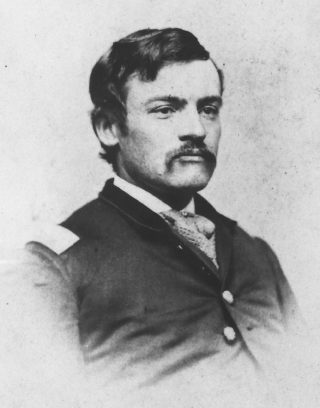“People told him he was going to be beaten by a woman, and he got his blood up, and that raised my grit.”
Lavinia Goodell, October 15, 1874
In August of 1874, just two months after being admitted to practice law, Lavinia Goodell was hired by a Chicago firm to sue a Janesville storekeeper who had refused to pay for a sack of peanuts.

The Janesville Gazette took note of the case:
Miss Lavinia Goodell appeared in justice court this morning as attorney for Messrs. Smith & Lord, of Chicago, in an action against John Davies, of this city. The suit was brought to recover the value of a sack of peanuts, which the plaintiff sent to Davies among other goods. He claims the nuts were worthless and refuses to pay for them.
The debtor in the suit was represented by Pliny Norcross, who had been one of Lavinia’s mentors during the time she was studying law.

Lavinia became distraught when it appeared to her that Norcross’s actions in the case were not entirely honorable. She wrote her cousin Sarah:
I am in a highly tragic frame of mind, in consequence of being “mad” with Norcross. I don’t know but our little peanut case is going to have the effect of causing us to quarrel in downright earnest and never make up again. It is perfectly ridiculous, but “such is life!” You see he is acting just as mean and tricky as he can in the preliminary proceedings, evidently trying some game on me to get his case without a trial on the merits, which he evidently is afraid of. It amuses me immensely that he should be afraid of me in any event, and I think his case must be very weak, and he very cowardly and unmanly to try to crawl out through some knot hole, but that is exactly what he’s up to. I think I can manage him, as far as that is concerned, but I feel dreadfully cut up that he should be so mean as to try to take advantage of my inexperience, give me misinformation, and not show me calm and professional courtesy in these matters….
I had a notice of depositions to serve on him, and he refused to sign the acknowledgement of service. I never was so taken aback in my life…. I told him laughingly … that I should make a strong point in court by telling them how he had acted, and tried to avoid an issue by trickery and chicanery. I hinted that he was dishonest and that I couldn’t trust him….
I told Ed Carpenter about it (he is a young lawyer of 2 or 3 years experience) and he said that such conduct was unprofessional and ungentlemanly, mean and contemptible, and that decent lawyers don’t generally act so. I suppose N. thought I shouldn’t know but what it was all right, and he took advantage of my confidence in him to deceive me and tell me it was all right and “professional.”
The case went to trial on October 12, 1874. Lavinia wrote in her diary, “Argued the peanut case with N. this morning before Judge Prichard. N. had simmered down and behaved quite civil…. Think I had the better of him decidedly and a good deal of fun on it. Verdict to be rendered Wednesday.”
The Janesville Gazette praised Lavinia’s presentation:
Miss Goodell made an argument of half an hour in length, which proved she had studied the case with great care. She seemed perfectly at home in the court room, maintaining a natural bearing, and displaying considerable forensic powers in arguing her points. Justice Pritchard took the case under consideration, and will deliver an opinion next Wednesday.
On October 14, the Gazette reported, “Judgment was rendered this morning in the case of Lord & Smith, of Chicago, against John Davies, of this city. They recovered $2.00 and costs, altogether amounting to $15.01. A dear sack of peanuts.”
Lavinia was not particularly pleased with her partial victory, writing in her diary:
Went down to court to see what was result of suit. I got judgment but not for whole amount, which I consider abominable. N. quite subdued and civil, but I can’t get over his conduct. It don’t seem as if I ever could.
The following day she wrote, “N. owns up beat and is trying to put the best face on it and be friendly again. I never shall respect him, but I suppose it is best to be civil.” She sounded a bit more sanguine when she wrote to her sister:
Hurra! I beat Norcross on the peanut case! He contested it very hotly. Raised heaven and earth to beat me, but I got ahead of him in all his little capers and came out first best. I vastly think he cared more about it than I did & got real nervous over it. You see people laughed at him about it, and told him he was going to be beaten by a woman, and he got his blood up, and that raised my grit, and we had it hot and heavy…. Norcross feels quite cut up over the result, but owns up beat, and puts a brave face on it. I think he was foolish to care so much about it.
The peanut case provided Lavinia with invaluable experience in how to manage a trial, how to handle a less than completely favorable outcome, and how to deal with a cunning opponent, all of which lessons served her well in the years to come. NK
Sources consulted: Janesville Gazette (October 8, 12 & 14, 1874); Lavinia Goodell’s diary (October 12, 14, & 15, 1874); Lavinia Goodell letter to Sarah Thomas (September 27, 1874); Lavinia Goodell letter to Maria Frost (October 15, 1874).







